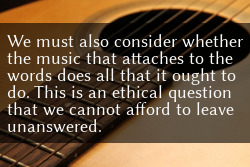From the Archive: Singin' About Dyin'
 Originally posted 10/3/12.
Originally posted 10/3/12.
When my dad was diagnosed with terminal brain cancer a few years ago, quite a few changes occurred in my perspective on life and death. The brevity and fragility of life were no longer abstractions. I truly felt them. One result of this new awareness was that I began to notice all the hymns and songs with stanzas about dying.
I recall selecting some songs for Sunday school one day. As I glanced down the list of songs in our database—those we hadn’t sung in a long time, I came to a title I’d passed over many, many times. This time it gripped my attention. A song that had seemed frivolous and silly to me before now moved me deeply as words and music played involuntarily through my mind.
Some glad morning when this life is o’er, I’ll fly away
To a home on God’s celestial shore, I’ll fly away.
The congregation sang it in Sunday school. It’s providential that I was at the piano because I don’t think I could have sung it. Though it had never been more than a light, peppy trifle to me before, it was now too strong to sing.
For a while, quite a few songs were hitting me like that.
 Reposted, with permission, from
Reposted, with permission, from 
Discussion